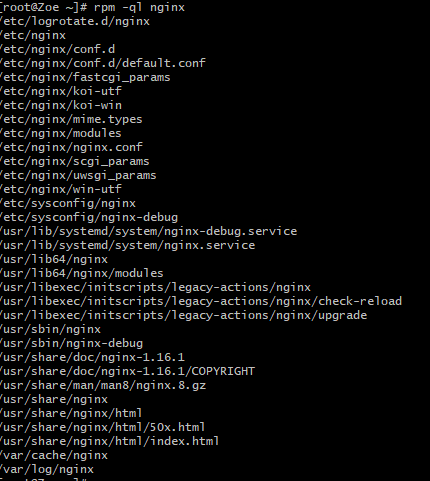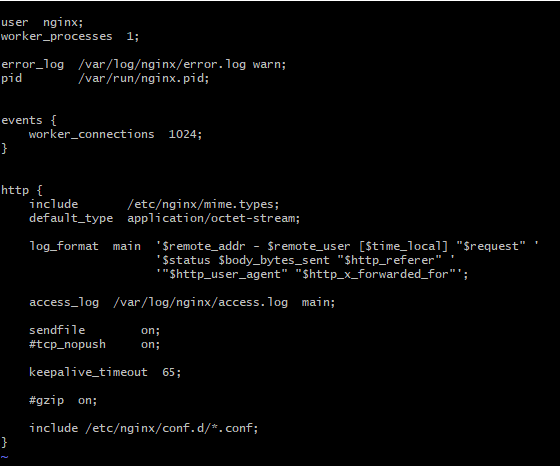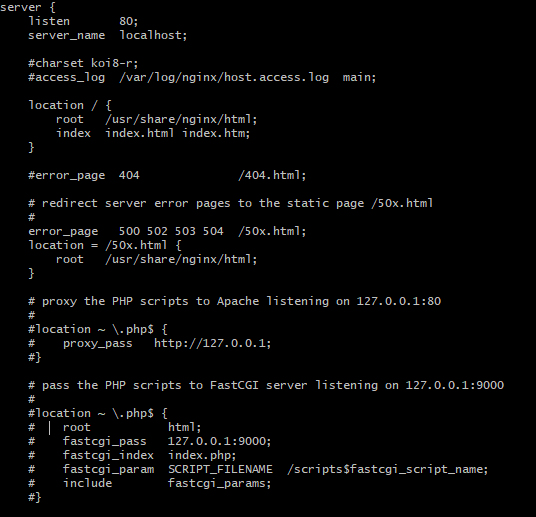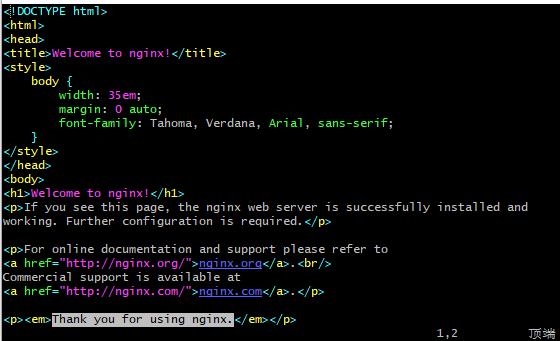Nginx 小入门记录 之 Nginx 配置文件解读(二)
上一小节主要是记录一些环境准备和Nginx的安装,接下来对Nginx基本配置进行记录。
查看配置文件安装记录
可以通过以下Linux命令进行查看:
1 | rpm -ql nginx |
rpm 是liunx的包管理工具,-q代表询问模式,-l代表返回内容列表,后面是查找相关的包关键词。
如图所示:

了解Linux系统都知道,安装的包,如果需要进行相关配置,配置文件一般都在/etc目录下。
配置文件解读
nginx.conf文件解读
nginx.conf 文件是Nginx的主要配置文件,在服务器环境搭建的过程中,经常根据需要进行该文件的修改。
如上图所示,可以知道nginx.conf的文件位置,所以进入对应目录,并用vim将文件打开
1 2 | cd /etc/nginxvim nginx.conf |
就能看的nginx.conf的文件内容

每项配置含义如下(下面解释是参照jspang的)
1 2 3 4 5 6 7 8 9 10 11 12 13 14 15 16 17 18 19 20 21 22 23 24 25 26 27 28 29 30 31 32 33 | #运行用户,默认即是nginx,可以不进行设置user nginx;#Nginx进程,一般设置为和CPU核数一样worker_processes 1; #错误日志存放目录error_log /var/log/nginx/error.log warn;#进程pid存放位置pid /var/run/nginx.pid;events { worker_connections 1024; # 单个后台进程的最大并发数}http { include /etc/nginx/mime.types; #文件扩展名与类型映射表 default_type application/octet-stream; #默认文件类型 #设置日志模式 log_format main '$remote_addr - $remote_user [$time_local] "$request" ' '$status $body_bytes_sent "$http_referer" ' '"$http_user_agent" "$http_x_forwarded_for"'; access_log /var/log/nginx/access.log main; #nginx访问日志存放位置 sendfile on; #开启高效传输模式 #tcp_nopush on; #减少网络报文段的数量 keepalive_timeout 65; #保持连接的时间,也叫超时时间 #gzip on; #开启gzip压缩 include /etc/nginx/conf.d/*.conf; #包含的子配置项位置和文件 |
大家先知道个大概,后续会针对每一项配置进行配置显示。
default.conf文件配置
default.conf 是默认的子配置文件,是根据主配置文件最后一行加载的。
一样,如刚开始的图知道default.conf的目录位置,然后打开该配置文件
1 2 | cd /etc/nginx/conf.dvim default.conf |
看的如下图

每项配置含义如下(下面解释是参照jspang的)
1 2 3 4 5 6 7 8 9 10 11 12 13 14 15 16 17 18 19 20 21 22 23 24 25 26 27 28 29 30 31 32 33 34 35 36 37 38 39 40 41 42 43 44 | server { listen 80; #配置监听端口 server_name localhost; //配置域名 #charset koi8-r; #access_log /var/log/nginx/host.access.log main; location / { root /usr/share/nginx/html; #服务默认启动目录 index index.html index.htm; #默认访问文件 } #error_page 404 /404.html; # 配置404页面 # redirect server error pages to the static page /50x.html # error_page 500 502 503 504 /50x.html; #错误状态码的显示页面,配置后需要重启 location = /50x.html { root /usr/share/nginx/html; } # proxy the PHP scripts to Apache listening on 127.0.0.1:80 # #location ~ \.php$ { # proxy_pass http://127.0.0.1; #} # pass the PHP scripts to FastCGI server listening on 127.0.0.1:9000 # #location ~ \.php$ { # root html; # fastcgi_pass 127.0.0.1:9000; # fastcgi_index index.php; # fastcgi_param SCRIPT_FILENAME /scripts$fastcgi_script_name; # include fastcgi_params; #} # deny access to .htaccess files, if Apache's document root # concurs with nginx's one # #location ~ /\.ht { # deny all; #}} |
根据default.conf内容所知,Nignx的根目录为 /usr/share/nginx/html, 进去看看都有哪些内容:
1 | cd /usr/share/nginx/htmlls |

index.html的内容:

如上图所示,默认里面有50x.html、index.html两个页面, 里面内容都是可以根据自己需求进行编辑、添加的;
到这里,先启动Nginx服务(具体命令下一次记录详细说明),现在运行以下命令即可:
1 | systemctl start nginx.service #这个命令是Linux环境下启动服务程序的标准命令 |
启动服务器后,打开浏览器,如上端口默认配置的是80,访问对应的物理机的IP,我的虚拟机IP是192.168.145.128,可以看到以下界面,这个就是默认index.html的内容。

基本配置简单进行记录在这吧,下一次继续记录Nginx的启动、停止等常用命令及自定义错误页。





【推荐】国内首个AI IDE,深度理解中文开发场景,立即下载体验Trae
【推荐】编程新体验,更懂你的AI,立即体验豆包MarsCode编程助手
【推荐】抖音旗下AI助手豆包,你的智能百科全书,全免费不限次数
【推荐】轻量又高性能的 SSH 工具 IShell:AI 加持,快人一步
· 10年+ .NET Coder 心语,封装的思维:从隐藏、稳定开始理解其本质意义
· .NET Core 中如何实现缓存的预热?
· 从 HTTP 原因短语缺失研究 HTTP/2 和 HTTP/3 的设计差异
· AI与.NET技术实操系列:向量存储与相似性搜索在 .NET 中的实现
· 基于Microsoft.Extensions.AI核心库实现RAG应用
· 10年+ .NET Coder 心语 ── 封装的思维:从隐藏、稳定开始理解其本质意义
· 地球OL攻略 —— 某应届生求职总结
· 提示词工程——AI应用必不可少的技术
· Open-Sora 2.0 重磅开源!
· 周边上新:园子的第一款马克杯温暖上架